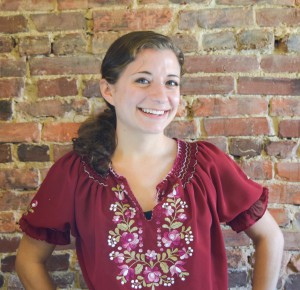Data Scientist Shannon Cebron on Why She Loves Coming to Work
September 30, 2015
 Shannon is a data scientist at Pegged Software, a Baltimore-based tech company that is revolutionizing the hiring process to make it work better for employees and employers. She has a bachelor’s and a master’s degree in applied math and statistics. She recently spoke with us about her job and why she pursued a career as a data scientist.
Shannon is a data scientist at Pegged Software, a Baltimore-based tech company that is revolutionizing the hiring process to make it work better for employees and employers. She has a bachelor’s and a master’s degree in applied math and statistics. She recently spoke with us about her job and why she pursued a career as a data scientist.
What is your job at Pegged Software?
I create statistical models that form the backbone of Pegged Software’s product, which helps employers select job candidates based on how likely they are to be successful. We look beyond traditional performance predictors, such as education and GPA, to consider things like personality traits. By using statistics, we are able to measure these traits, and the candidate’s goodness-of-fit, in an objective way.
We use data gathered from our clients to help inform these insights, and I am instrumental in identifying the data we need to gather and how we analyze it to help clients choose successful candidates who historically might have been overlooked by hiring managers.
How did you become interested in data science and statistics?
I was always interested in disciplines that have patterns, such as foreign languages. I also liked math, computing and logic, all of which are important in data science. I also really wanted to make a positive difference through my work, and it was clear to me I could do that as a data scientist. There are so many important and interesting problems to be solved in the field.
In my case, I’m helping to eliminate bias from the hiring process in the hope that people who have been traditionally overlooked for jobs (but have the potential to be successful) might get another chance. That’s just one area where data scientists like me are making a difference.
What is one of the most interesting problems or questions you’ve tackled recently?
Right now, I’m building a model to extract meaningful data from writing samples in order to yield insights about a job candidate, such as how much excitement that person has for the position. I’m solving intellectually interesting problems like this all the time, so my job is never boring.
How has knowledge of statistical science helped you in your career in data science?
It’s helped me immensely. You can’t practice data science without statistics—it’s the foundation of the field.
What advice would you give to someone thinking of a career in data science?
Take some advanced statistics courses if you want to see what it’s like to be a statistician or data scientist. By that point, you’ll be familiar with enough statistical methods to begin solving real-world problems and understanding the power of statistical science. I didn’t realize I wanted to be a data scientist until I took more advanced statistics courses, around my third year as an undergraduate math major.
What do you like about being a data scientist?
I love coming to work every day. I’m solving interesting problems and am always excited to approach the next thing on my to-do list. I also get to work with a lot of really cool people from all sides of the company, from engineering to marketing. I’m really happy with my career choice.
Related Posts

Hindsight Is 2023 for Former Statistics and Data Science Students
It’s back-to-school season! Gear up for the upcoming semester and consider diving into the captivating world of statistics and data science. Looking for diverse job opportunities that span across every industry? Look no further! With a variety of graduate programs and jobs, now is a great time for students to become data scientists and statisticians….

Elizabeth J. Kelly: “Statistics is for Adrenaline Junkies”
Elizabeth J. Kelly has always loved math, and as a professional statistician at Los Alamos National Laboratory (LANL) and a recreational rock climber, Elizabeth is an avid thrill-seeker who enjoys a challenge. “Math reminds me of climbing, including the need to focus, problem solve and persevere. I guess I ended up in statistics because I…
